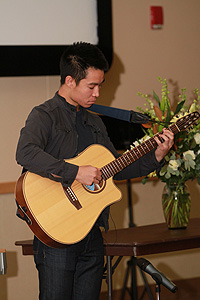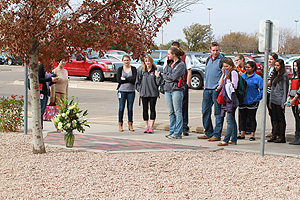Medical Students Honor the First Patient

Willed bodies impact not only medical students, but also their future patients for generations to come.
They are called by many the first patient or first teacher. Most students agree choosing to donate your body for medical education and research is one of the most generous contributions given to TTUHSC.
The School of Medicine Class of 2017 honored those who have donated their bodies to the Willed Body Program with a memorial.
Murtui Vivos Docent
Matt Driver, School of Medicine 2017 class president and first-year medical student, said health care institutions need cadavers for teaching purposes and depend heavily upon donors.
“We are deeply grateful to those who donate their bodies to help further our medical education,” Driver said. “With this memorial, we want to thank those who have given so much to us personally, and through their gift, helped make us better physicians and health care professionals.”
At the TTUHSC anatomy lab, a sign in the entrance reads as a reminder, “Mortui Vivos Docent,” or “the dead teach the living.” Driver said willed body programs impact health care professional students in many ways.
“Their generosity will impact more than just the students, but also generations of patients,” Driver said. “We have a lot of respect both for the families as well as those who are donating to our program, and for that we want to honor them."
Unforgettable Experience
Vaughan H. Lee, Ph.D., the Dr. Bernell Dalley Endowed Professor of Medicine Education and the director of Clinically Oriented Anatomy, said these medical students spend 10 weeks in the anatomy course with five students per cadaver. They work with three different cadavers during their dissection experience.
“This experience helps them value life and helps the students relate with humanity during the process,” Lee said.
During anatomy, the students are only told the donor’s age and cause of death. Lee said he vividly remembers his first day of anatomy many years ago.
“I remember connecting with the donor thinking about if he was a part of someone’s family, a father, grandfather, a living person and thinking of his family, did he suffer?,” Lee said. “This is an experience no one can tell you about until you experience it for yourself. The emotional impact of the first dissection on the body is done with great respect. The body’s face is covered and you maintain a balance, a mix of concern because we remember the donor is a person. There also is fear and concern. The students are here to learn from the donor and have to begin the business of learning from the dissection. They may be reluctant at first, but once they get past that, they know this is to learn the internal structure of the human body. This person gave their body for this process that in the end we would be great physicians and take care of patients.”

The memorial gave students the opportunity to show the patients and their families their gratitude.
Contribution for the Future
Claude Lobstein, director of the Willed Body program, has four tall filing cabinets full of applicants who have donated their bodies to the program. The Willed Body Program allows for a person to donate their body for teaching or research purposes.
The Willed Body Program receives approximately 200 bodies a year. To date, 4,932 have donated their bodies to the program since the School of Medicine began. Lobstein’s file cabinets have another 5,746 applications of people who have made arrangements to will their bodies.
“There are many reasons a person donates,” Lobstein said. “Many times a relative has done it, they don’t want the expense of a funeral, or they want to contribute to the future of medicine by helping our students and researchers learn from them. We receive applications from Abilene to Oklahoma and some Eastern New Mexico."
The Willed Body Program works under the rules and regulations of the State of Texas Anatomical Board. The bodies are prepared and kept in stainless steel tanks the width of a casket. The tank holds the body on a tray filled with alcohol and water to keep the body preserved. The tank allows the students and researchers to lift the body at angles when working with them. After the anatomy classes are completed, the family has the option to take the cremated remains or have them be a part of the Willed Body Program burial site at Resthaven Memorial.
A Way to Live On
At the memorial many medical students reflected on the program and what their donor meant to them.
Jessica Turner, first-year medical student, said this was an opportunity to show their appreciation for the donor’s gift.
“I had mixed emotions when I walked in my first day of anatomy,” Turner said. “I was nervous, yet appreciative of what I knew I was about to learn from them. I came fully to terms with what the body would teach me. I can read a text book all day, but to study the actual body and learn it from so many angles, to have a real human teaching me, is humbling at the end of the day.”
Other students who spoke agree.
“The bodies live on through the patients we will help in the future,” said Gus Wilson, first-year medical student. Mario Martinez, also a first-year medical student, spoke about what he learned about humanity. “With death all around us, what is the meaning of life? It is about reaching out to serve, impacting people, humbling ourselves and today showing the donors and their families how truly grateful we are.”
Driver said at the ceremony, “Look around you. In four years we will be doctors, saving lives all due in part to the amazing men and women who gave their bodies to this program.”
The memorial service was for the first-year medical students, yet two ladies whose husbands had donated their bodies to the Willed Body Program also attended.
“She said she had to come,” Lobstein said. “She had to see if her husband had been treated with respect. And after witnessing the memorial and listening to the students honor the donors with poems, music and reflect of their importance to them, she said there is no doubt in her mind that they do.”
Related Stories
Celebrating Veterans: TTUHSC’s General Martin Clay’s Legacy of Service and Leadership
From his initial enlistment in the Army National Guard 36 years ago to his leadership in military and civilian health care management roles, Major General Martin Clay’s career has been shaped by adaptability, mission focus and service to others.
Texas Tech University Health Sciences Center School of Nursing Named Best Accelerated Bachelor of Science in Nursing Program in Texas
The TTUHSC School of Nursing Accelerated Bachelor of Science in Nursing (BSN) program has been ranked the No. 1 accelerated nursing program in Texas by RegisteredNursing.org.
TTUHSC Names New Regional Dean for the School of Nursing
Louise Rice, DNP, RN, has been named regional dean of the TTUHSC School of Nursing on the Amarillo campus.
Recent Stories
National Academy of Inventors Names TTUHSC Faculty Senior Members
The National Academy of Inventors (NAI) has designated two current and one former TTUHSC faculty researchers as Senior Members.
The John Wayne Cancer Foundation Surgical Oncology Fellowship Program at Texas Tech University Health Sciences Center Announced
TTUHSC is collaborating with the John Wayne Cancer Foundation and has established the Big Cure Endowment, which supports the university’s efforts to reduce cancer incidence and increase survivability of people in rural and underserved areas.
TTUHSC Receives $1 Million Gift from Amarillo National Bank to Expand and Enhance Pediatric Care in the Panhandle
TTUHSC School of Medicine leaders accepted a $1 million philanthropic gift from Amarillo National Bank on Tuesday (Feb. 10), marking a transformational investment in pediatric care for the Texas Panhandle.
